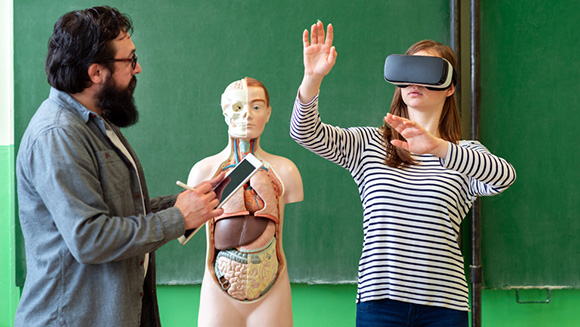To go or not go to college, that is the question.

As the ’24-’25 school year creeps closer and closer, and new trends emerge every day, you may be asking yourself, is going to college still worth it? It’s a valid question. Technology is evolving faster than our minds can keep up with, providing new, non-traditional modes of learning than ever before while also completely changing the future of the workforce. As students, we want to know that we’re investing our time and money into an education that will apply to our current careers, goals, and passions and aid us in keeping up with current industry demands. And to put it frankly, there isn’t time to waste.
Considering all these factors, college remains a viable mode of education. To match the demands of the workforce and student needs, colleges have no choice but to integrate and apply these new technological and workforce advancements to their educational models to match student needs and keep up with industry demands as they continue to evolve.
In this blog, we’ll be exploring the Top 7 Reasons to Go to College in ’24-’25, with valuable, relevant data and insights to back us up!

1. Online Education is here to stay
The pandemic brought a sharp rise in the already steadily growing trend of online education, and it isn’t going anywhere anytime soon. Online education has brought much-desired flexibility to students who may be working full-time jobs, are parents, or have other personal responsibilities that require an adjustable school schedule.
Community College Daily reported that over the next decade, 75% of overall students will be enrolled online, while in-person enrollments will be at 25%, and according to the University of Central Florida, online students retain 25%-60% of the material and require 40%-60% less study time than in a traditional classroom setting due to being able to learn at their own pace.
Considerably, online learning does come with challenges, and won’t be universal for every student, but as it continues to evolve, students who possess the desire, need, and discipline for an online education will continue to see educational paths that will be reflective of their needs, allow for flexibility in their schedules as they learn at their own pace, and provide them the time to pursue other interests and goals they have while still obtaining a valuable education.
Explore Online Education @ Coastline
2. Advancements in the Technology Industry
Along with advancements in education also come advancements in the workforce. The World Economic Forum’s 2023 Future of Jobs Report projects that the majority of the fastest-growing jobs over the next five years will be roles in technology, AI, and machine learning specialists leading the list, and The Community College Research Center reported in 2022 that colleges are responding to these advancements across various industries by creating new roles to build connections with employers to expand work-based learning programs and simulate work scenarios at colleges to spotlight various workplace skills.
Colleges are responding to these industry demands by offering more technology-related courses, programs, and certifications to meet the evolving workforce’s demands for these roles and skill sets, and students will want to get ahead of the curve to meet those demands, as well as.

3. Develop and Strengthen Core Skills
College is a great way to develop and strengthen transferable core skills, and according to WEF 2023 Future of Jobs Report skills outlook projections, creative thinking, analytical thinking, and technological literacy are highlighted as the top three skills on the rise over the next 5 years in the workforce, with cognitive skills growing the most quickly.
There are always opportunities to work on these skills throughout your education, whether it be through uniquely finding answers to problems through extensive research, writing essays, or evaluating information, going to college allows you to develop these skills and transfer them to fields like marketing, law, data analyzing, and so much more, which will make you a competitive candidate in the future workforce.
4. Virtual Immersive Learning
Sitting and reading about subjects isn’t a successful way of learning for everyone—some students need a more hands-on approach, which is why immersive learning is becoming more prominent in higher education.
VR and AR are currently being implemented to foster engagement and interactive learning among students. For example, EdTech magazine spoke with an architecture professor at UC Berkley, Luisa Caldas, who created an XR solution for students to create models in virtual spaces, which allows their peers to experience the models they’ve made and have further discussions on what they’ve worked on.
Additionally, UCF reports that AR/VR learning platforms such as Unimersiv and Nearpod allow students to explore historic sites and scientific items without having to leave the classroom, giving students an interactive learning experience to textual learning. As this technology is implemented in higher education learning, students will be able to fully immerse themselves and become engaged in the subjects their learning about.

5. Alternative Credential Options
Even with online learning options, between full-time jobs, parenting, and other personal challenges, some students don’t have the time to go to school, or back to school, to get a traditional degree, and are only seeking to strengthen and progress their skills in a specific area of interest.
In recent years, colleges have begun offering alternative credential options such as career-focused pathways that will help to hone skills specific to your career or passion and reach current personal and professional goals in a cost-efficient, shorter way than traditional degrees, and allow them to enter the work-force at a faster pace while tending to other responsibilities.
For example, Coastline College is implementing this approach with its Career Education program. They offer industry-focused programs to meet current industry demands and provide students with the skills needed to be successful competitors in the workforce with industry certifications, on-the-job training, and stackable credits that could lead to a full degree. Additionally, through Coastline’s Work-Based Learning program, students can also earn extra credits to apply toward their certificates or degrees if they’re working in a field related to their major.
Certificate Options @ Coastline
6. Personalized Learning
Advancements in online learning also come with the ability to individualize how we learn, and personalized learning will allow that. According to EHL Insights, students will be asked for their input on how to customize the curriculum and will have freedom over what they learn while still having guided learning pathways, which gives students autonomy over their education.
Additionally, it’s important to note that changes in the academic advising approach such as switching from a one-size-fits-all approach to an individualistic, developmental approach, will also be a major aspect of personalized learning. With a developmental approach, students will be given the support they need to choose educational pathways based on their individual needs and interests that are conducive to their success, instead of being told to take classes that don’t necessarily align with what their goals are or won’t be applicable in the long term.

7. Network, Network, Network
Networking in college has always been integral, and with the rapidly evolving workforce, it’ll be more important than ever. As new courses are introduced to college curriculums following industry demands, students will relate to and be taught by professors who specialize in fields that correspond with their career pursuits. With this, they can gain hands-on experience by seeking internships and job opportunities alongside or in the same field as these professors, giving them the ability to be directly mentored in their area of interest and gain new experiences, connections, and skills to apply to future opportunities.
Summary
How colleges choose to respond to our rapidly changing world is imperative to the future of higher education, and to how students choose to respond. We want to be able to rest in the fact that we made a good decision for our lives in the short-term, and the long-term, and for the incoming class of ’24-’25, this is critical. With emerging trends in learning, credential options, and rising skills in education and the workforce, college is still essential to students keeping up with, and being prepared for new advancements. And as those advancements come, students learn to be quick, and proactive wielders of power over their educational journey.